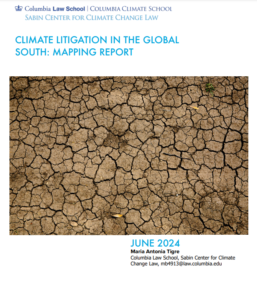 In recent years, climate litigation has witnessed a surge in cases across the world. While scholarly interest has predominantly focused on cases from the Global North, attention to litigation originating in the Global South has been lacking, yet crucial in understanding the broader climate litigation landscape.
In recent years, climate litigation has witnessed a surge in cases across the world. While scholarly interest has predominantly focused on cases from the Global North, attention to litigation originating in the Global South has been lacking, yet crucial in understanding the broader climate litigation landscape.
Today, the Sabin Center publishes Climate Litigation in the Global South: Mapping Report, which serves to shine a spotlight on the current state of climate litigation in the Global South. The report utilizes data from the Sabin Center’s Global Climate Change Litigation databases, which has seen an influx of new cases in recent years, thanks to enhanced data collection efforts and more cases being filed, especially in the past four years. By analyzing key metrics such as case numbers, statuses, trajectories, and legal decisions, the report offers concise analyses of climate litigation within each jurisdiction. It acknowledges the challenges and opportunities unique to the Global South’s legal landscape. As of March 2024, the databases encompass close to 2,629 cases, spanning 54 jurisdictions (excluding international or regional courts, tribunals, quasi-judicial bodies, or other adjudicatory bodies). Of these jurisdictions, 21 are from the Global South, accounting for 40.7% of those covered. However, despite this representation, Global South cases in the database are proportionally lower in number. Global South cases represent only 8.3% of the total cases documented.
Further findings from the report include:
- Case filings in the Global South have grown since 2015, with 2020 recording the highest number.
- Latin America and the Caribbean account for 70.4%, Asia 12.2%, Africa 8.5%, and the Pacific 8.9%.
- In terms of jurisdictions, Brazil has the highest proportion of cases at 39%, followed by Mexico at 10.5%, Indonesia at 7.1%, and Colombia at 6.7%.
The report structures its analysis by providing overviews of climate litigation in the Global South, followed by detailed examinations of major regions—Africa, Asia-Pacific, and Latin America and the Caribbean. Each regional section includes insights on trends, summaries of individual jurisdictions, and analyses of climate change cases within each jurisdiction. Regional findings include:
- Africa: Representing 8.5% of cases within the Global South, Africa comprises 5 jurisdictions with 19 cases documented since 1997. While there were a few examples of early cases of climate litigation in Africa, the filing of cases became more consistent after 2016.
- Asia-Pacific: Accounting for 21% of cases within the Global South, the Asia-Pacific region consists of 8 jurisdictions with 45 climate cases. While there were a few early examples of climate litigation in the region, cases consistently picked up after 2009. It is likely that several pending cases have not yet been advertised, potentially increasing the number of cases beyond the database’s current portrayal.
- Latin America and Caribbean: With 70% of cases within the Global South, this region comprises 9 jurisdictions with 154 cases. Cases have consistently grown since 2011, with 2020 witnessing the highest number of filings. Through this structured approach, the report not only illuminates the current state of climate litigation but also identifies key patterns, challenges, and opportunities.
The report addresses a critical gap in data pertaining to the landscape of climate litigation in the Global South across regions and jurisdictions. It provides a comparative analysis of climate litigation trends across the Global South and identifies key patterns, challenges, and opportunities. The report, which is available here, serves as a valuable resource for scholars, practitioners, and climate advocates seeking to navigate and understand the complex landscape of climate litigation.
Source link
All Materials on this website/blog are only for Learning & Educational purposes. It is strictly recommended to buy the products from the original owner/publisher of these products. Our intention is not to infringe any copyright policy. If you are the copyright holder of any of the content uploaded on this site and don’t want it to be here. Instead of taking any other action, please contact us. Your complaint would be honored, and the highlighted content will be removed instantly.


